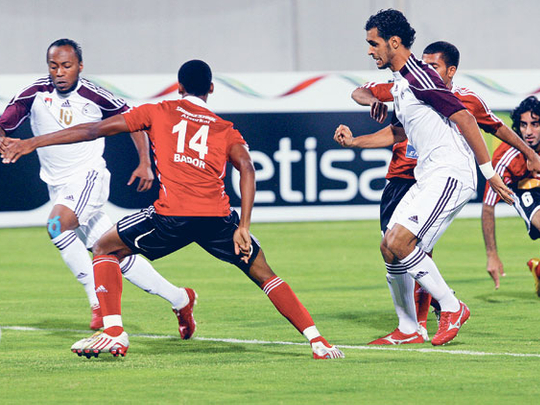
Dubai: Carlo Nohra the newly appointed Chief Coordinating Officer of the UAE Football League (UFL) talks about his priorities heading into the set-up's third edition as a professionalised entity.
We ask what needs to be done further to bring the system more in line with regional and international standards, and what he hopes to have achieved by the end of his tenure by means of gauging success along the path of professionalism.
Gulf News: What's your priority for the league?
Carlo Nohra: We have to deliver matches. That's what brings the money in. We've gone for a strategy like Fifa and Uefa use whereby panels oversee matches but rely heavily on local provisions by the club to run their own affairs. Before it was an event management company that handled all match day organisation on behalf of UFL, but now hopefully we can scale back the project and let the clubs run their own affairs in keeping with our educational components. Commercially we need to see how we can provide better value to our sponsors. We generate revenue from selling TV rights and sponsorship but there are avenues for greater income that are yet to be exploited.
How much profit did the UFL make last season? Is it a success?
Dh84 million, that's successful year-on-year, but to refer to this as a profit or dividend declared by us to our members is not exactly accurate because there is a lot of work this money goes toward at the clubs. Whatever the quantum is when you take out overriding expenses the balance is split 50 per cent and shared equally among the clubs. The other 50 per cent is distributed, based on league and cup performances. On a club by club basis it's not really that much. It wouldn't cover one player.
What long-term results can be a gauge of success?
I want to leave this job knowing that we're doing things right measured by the following; exporting at least one player, one of our clubs to become champion of Asia, the introduction of a salary cap and to have worked closely with local schools in order to set up a feeder system based on the US National Collegiate Athletic Association (NCAA) model where only the cream of the crop rise through the ranks. The salary cap won't thwart growth but is to be a pure reflection that the league is genuinely operating on its income, not on backers. How much do we bring in commercial revenue spread among the clubs and does that cover cost of operating? If the two balance each other out I think we are doing well. The introduction of a salary cap would assist that. Clubs generating profits from their own revenues reflects economic responsibility.
How will your experience help in this role?
I started off at the World Sport Group, the marketing arm of the AFC. I grew through ranks from an executive putting up boards in stadium to anchoring relationships with sponsors to then selling sponsorship. I joined the AFC as Director of Competitions and did a number of Asian Cups. So I had 10 years commercial experience then seven years on the technical side. I think as an all round experience I'm in the situation now where I can implement that experience into a project that needs it. A league is different to running World Cup qualifiers, it's more of a day-to-day approach. But the principles don't change. Essentially we need to exist to sell a product. That's what my experience allows me to do, bring in a product mentality conduit to professionalising the league here.
Is attracting older imports the correct way to build a league?
The benefits that successful, experienced players can bring to a team have long been recognised. I believe that combining this approach with a strategy of nurturing and developing local players will often reap the rewards. The J-league, especially at its inception, is a great example. In partnership with the UAE Football Association, the UFL has set firm regulations on the buying of foreign players and from this coming season 2010/11 all UFL Clubs will only be able to buy three foreign players in total. This is to ensure foreign imports aren't at the expense of local talent and football development in this country.
Is the football culture here open to every audience?
No, but it's definitely high on our agenda to change this. We can't make football grow here unless we make it more visible to the larger community that lives within these boundaries. People don't know it exists. We have to get clubs to recognise their role in changing this, it's not a direct UFL initiative, we've got to be a conduit through the clubs to make themselves relevant to their community. We've had encouraging talks with broadcasting about English commentary but it won't stop with that. There are millions of football lovers here we just need to capitalize on that. The World Club Cup just shows us that if we put on a good show people will flock toward these matches.
Where does the UFL stand in terms of other Asian leagues?
We're number five out of 46 leagues in Asia based on the AFC's criteria. The criteria is not conducive to make a leap up. If they stopped thinking quantative and introduced some qualitative criteria we'd make the leap. The AFC say attendances should jump from 2,000 to 5,000. That's a big percentage leap. It's a psychological mindset we have to overcome. We've got to introduce professionalism. We've got to get clubs and players to want professionalism to see the benefits, they have to gain experience before they are productive and then able to attain expectations of them. I wouldn't measure success of any of this in less than 30 years. It will take a long time to get to where it needs to be and of course there will be peaks and troughs.


![Copy of Copy of 568659-01-02 [1]-1731435828185](https://imagevars.gulfnews.com/2024/11/12/Copy-of-Copy-of-568659-01-02--1--1731435828185_193219e13e3_small.jpg)






